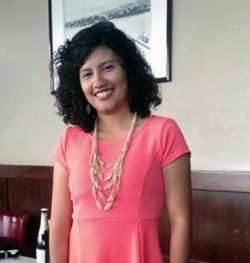The following is an English translation of a major article in El Nuevo Dia, written by Gerardo Leon E. Alvarado and posted November 15, 2015 with the title “Geógrafa puertorriqueña educa sobre el cambio climático” (“Puerto Rican Geographer Researches Climate Change”):
Growing up in a flood-prone area in Lajas, Puerto Rico and suffering the direct onslaught of Hurricane Georges in 1998 were circumstances that aroused Lumari Pardo-Rodríguez’s curiosity about and interest in atmospheric sciences, particularly the aspects of risk, vulnerability, and climate variability. “I had to work in some way to make sure these things do not happen,” she said, recalling that as a child and teenager she studied how hurricanes worked and followed their trajectories, since she thought the best way to help was working to improve the forecasts and atmospheric understanding of these phenomena.
In the absence of an academic specialization in atmospheric science and being uneasy about relocating to the States because she had not mastered English, Pardo-Rodríguez requested admission to the Interamerican University of Puerto Rico, where she completed a bachelor’s degree in mathematics with a minor in education. During her student years, she also had three summer internships at the National Center for Atmospheric Research (NCAR) in Boulder, Colorado. “During my three summers in the program, I realized that although I love the atmospheric sciences, I wanted to include something more directly related to the social problems of natural disasters than just the prediction of these phenomena. This program at Colorado helped me explore and develop to the point that I went to an ‘Ivy League’ university for my masters,” she said.
Pardo-Rodríguez was admitted to Columbia University, and she received her MA in “Climate and Society” in 2009. She explained that she was in a program that teaches people how to combine methods and theories in atmospheric sciences and social sciences. “In that program, I was in contact with and working directly with people who are leaders in adaptation, vulnerability, and impacts to climate change” she said, adding that after graduating, she worked with the Urban Climate Change Research Network, which is part of the Earth Institute at Columbia University.
“This is where I decided to pursue the research topic I am currently working on. People around me commented that my interest and my thinking paired nicely with geography. Although it sounds funny, my ignorance of geography was very great. Like many people, I thought that geography was memorizing capitals and knowing where topographic data and countries are located. At first I wondered why I wanted to study geography, but then I found that geography is much more than what they teach us in school. Geography helps you know why an event happens, why it happened in a particular place, and how to take into account the different scales at which an event occurs,” said Pardo-Rodríguez, who is currently pursuing a PhD in Geography in human-environment interactions at the University of California-Santa Barbara .
Pardo-Rodríguez works for the Department of Geography at the University of California-Santa Barbara, where she teaches and does research, depending on the semester. Since autumn 2011, she has been part of the “Human-Environment Dynamics Lab,” led by Professor David López-Carr. As part of her doctoral project, Pardo-Rodríguez will travel to Peru next January, specifically to the Peruvian highlands, to collect data about building resilience to climate variability and / or climate change. This area, illustrated below, experiences large annual variability over time, and it is approximately 4,000 meters above sea level.
“During my six months in that area, I will be visiting several farming communities by interviewing focus groups in order to obtain information that can help improve the measurement of vulnerability and even help reduce the effects that natural disasters can have on those communities. Although this project is in Peru, my goal is to use the study as a scaffolding for research in other countries and, at the same time, to improve the quantitative models of vulnerability, as well as decisions about adapting to these weather events,” said Pardo-Rodríguez, who hopes to complete her doctorate in a year and a half and then continue with studies in other parts of the world, with a special interest in South Korea.
Felicitaciones to Lumari!


